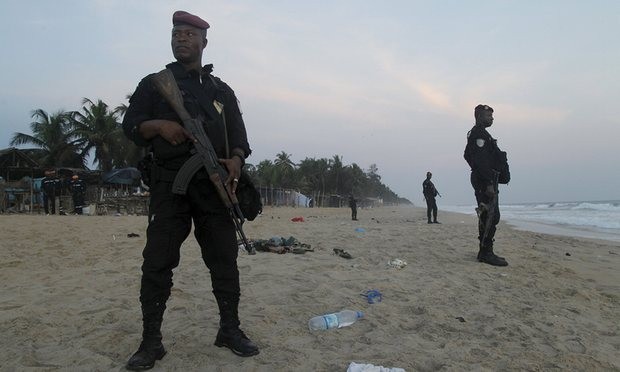Ivory Coast: armed men kill 7 in attack on tourist resort

Gunmen have killed at least 16 people, including four Europeans, after they opened fire near several hotels in the Ivory Coast. The shooting came amid fears the jihadi threat is spreading in west Africa.
The government said security forces had killed the six assailants who launched attacks on three hotels in the popular seaside town of Grand-Bassam, a weekend retreat for residents of Abidjan, about 25 miles (40km) away.
Among the 16 dead were two soldiers, said the president, Alassane Ouattara. Local media reported gunmen had entered the L’Etoile du Sud (the Southern Star) hotel, seizing guests and staff on Sunday. A French foreign ministry spokesperson said one French national had been killed. A jihad monitoring group said al-Qaida in the Islamic Maghreb had claimed the attack.
Koba Maiga, a local trader of Malian origin, said he was at the mosque when he heard gunfire at about 1.30pm local time.
“We had the war here a few years ago so we know automatic weapons when we hear them. Initially no one in town thought much of it, though. On Sundays, there are sometimes clashes between the security forces and youths from Abidjan who come down to the coast and cause trouble on the beach,” he said.
Throughout the shooting he stayed in Bassam town centre, avoiding crossing the bridge that leads to the beach. However, he spoke to friends who were in the beach area when the attack happened.
“It was carnage. They shouted ‘Allahu Akbar’ [God is great]. They were getting people to shout those words and they killed anyone who didn’t. There were at least four of them. Three walked side-by-side along the beach and there was a fourth man who finished off any survivors.
“A lot of people ran out into the sea to escape. So apart from the people who died from gunshots there may be people who have drowned and have been swept out to sea. They were sub-Saharan Africans. Even though they wore balaclavas everyone saw they had brown hands. Now it is calm, the Ivorian army is here. I am at the roundabout before the bridge. The beach area has been sealed off.”
Dramane Kima, who showed a video purporting to show the bodies of victims to Reuters, said: “I saw seven dead that I filmed. There were four attackers. I was swimming when it started and I ran away.”
He also took pictures of grenades and ammunition clips that he believed had been left behind by the attackers. One witness said the gunmen shot a child who was kneeling down and begging for mercy. The witness said a woman was also shot. Special forces in the former French colony were on the scene, and the beach where the shooting began was evacuated.
A spokeswoman for the Foreign Office said officials were urgently trying to establish whether any British nationals had been caught up in the incident.
The FCO advises against all but essential travel to the western regions of Dix-Huit Montagnes, Haut-Sassandra, Moyen-Cavally and Bas-Sassandra. It said of Sunday’s attacks: “On 13 March there have been reports of an armed attack at Grand-Bassam resort, near Abidjan. You should avoid the area if possible. If you are in the vicinity follow the instructions of the security authorities.
“There is a high threat from terrorism. You should be vigilant after recent attacks in Mali and Burkina Faso. Attacks could be indiscriminate, including in places visited by foreigners.”
Grand-Bassam, which has about 80,000 inhabitants, holds Unesco world heritage status.
Attacks in recent months on luxury hotels in the capitals of neighbouring Mali and Burkina Faso have killed dozens of people, leaving west African countries scrambling to boost security in the face of a growing jihadi threat.
Analysts have voiced fears that jihadi attacks could spread to countries such as Ivory Coast and Senegal, and the region’s US-led Flintlock military exercises that finished recently focused on the need to counter terrorist threats.
The attack took place nearly two months after Islamist fighters killed dozens of people in a hotel and cafe popular with foreigners in neighbouring Burkina Faso’s capital Ouagadougou.
The jihadist attack was the first of its kind in Ivory Coast – whose population is both Muslim and Christian – since militants began destabilising neighbouring Mali in 2012. A French military intervention that began in northern Mali in 2013 was extended to cover the entire Sahel region in 2014.
But Ivory Coast, where French peacekeepers were based from 2002 to 2014, has not been considered an anti-terror priority. Nevertheless, the country has seen limited Islamist activity since 2015 when groups linked to al-Qaida began lightning attacks in southern Mali, close to the Ivorian border.
In August 2015, there were reports in Mali that Ivorian authorities had arrested five suspected Islamic terrorist and seized firearms in the north of the country.
Those reports were later revised to suggest the suspected Islamists had been chased back into Mali. The group which has been most active in southern Mali, close to the Ivorian border, is the Massina Liberation Front, linked to al-Qaida in the Islamic Maghreb (Aqim).
The coordinated attacks in southern and central Mali – on a hotel housing UN staff at Sévaré in August 2015 and at the Radisson Blu Hotel in the capital, Bamako, in November 2015 – have been claimed by al-Qaida and al-Mourabitoun, erstwhile rivals who are currently working together.
How to submit an Op-Ed: Libyan Express accepts opinion articles on a wide range of topics. Submissions may be sent to oped@libyanexpress.com. Please include ‘Op-Ed’ in the subject line.
- North African leaders to hold summit in Libya - October 21, 2024
- Libyan MP predicts dollar tax reduction to 5% by Year-End - October 21, 2024
- Debate over CNN’s reporting reignited on X by Musk - October 21, 2024


